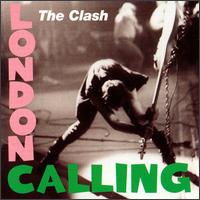Rating: 9
 Praise for drummers and bassists is often reserved for those with a flashy, dramatic style, those who play louder/faster/more sophisticatedly than others around them. But here at Steve and Abe’s Record Reviews, we believe in the power of creative ensemble work – the more closely a band works together to support the vision of the songwriter, the more we’re impressed. And judging from London Calling, Topper Headon and Paul Simonon were one the best rhythm sections ever.
Praise for drummers and bassists is often reserved for those with a flashy, dramatic style, those who play louder/faster/more sophisticatedly than others around them. But here at Steve and Abe’s Record Reviews, we believe in the power of creative ensemble work – the more closely a band works together to support the vision of the songwriter, the more we’re impressed. And judging from London Calling, Topper Headon and Paul Simonon were one the best rhythm sections ever. Track after track, drummer Headon and bassist Simonon deliver solid, creative parts in an endless variety of styles: disco on “Lost in the Supermarket”, reggae on “The Guns of Brixton”, shuffle on “Jimmy Jazz”, even a stately march on “The Card Cheat.” The quick shift from New Orleans R&B to ska on “Wrong ‘Em Boyo” is a marvel. Perhaps the finest example is “London Calling”, with a deep groaning bassline that opens into a piping trill while the snare pops out a martial rhythm that explodes into a funk cymbal line. The Clash’s rhythm section never slips up through 19 songs that run the gamut of rock-related styles; it’s a tour de force of empathetic rhythm work.
Of course, it’s easier to be a creative rhythm section when you’re working with great songs, and the Clash deliver plenty of those. Guitarists and vocalists Joe Strummer and Mick Jones have compiled a stunning collection of sprightly melodies, ear-grabbing hooks and killer riffs. Neither one has a particular gift for hitting notes, but the sheer drive and personality in the vocals makes up for any shortcomings. Samples of the brilliant songwriting: “London Calling” opens with a set of tense chords and a four-note melody that sounds like a trumpet call, laying out the apocalyptic tone of the song. The moog line and handclaps of “Hateful” sound like 10CC, but the catchy call-and-response of the verse is quickly subverted by the descending minor chords of the chorus. The lilting verse of “Spanish Bombs” is simply lovely, supported by a fascinating drum line featuring the bell of the ride cymbal. “The Card Cheat” takes a turn-of-the-century piano vamp and works it into a rousing rock number. “Lover’s Rock” grooves mightily on a modified funk guitar line. “I’m Not Down” is just waiting to be sequenced and turned into the next big dance-floor hit (check out the second verse for some incredible tom-tom playing). The ideas keep coming, and almost every one is a grabber.
An exquisite production balances perfectly the need for sonic clarity and musical cohesion – every instrument is audible, but the mix balances them for a tremendous punch. And it’s mostly gimmick-free, so the power of this band comes through unfiltered. The few tricks are thoughtfully presented, though: for example, the cry that “phony Beatlemania has bitten the dust” in “London Calling” is slyly subverted by a swirl of backward guitars straight out of Revolver, and the reverb return for the horns on “Revolution Rock” is fed to the opposite speaker to add to the swaying beat.
But the Clash were more than just great musicians – they always had a message. To these ears, London Calling is the story of what happens when you discover you can’t eat your ideals. “Every cheap hood strikes a bargain with the world and ends up making payments on a sofa or a girl,” indeed.
The album opens with a vision of nuclear doomsday, but then quickly discovers another sort of disaster: “My baby drove up in a brand new Cadillac... She said, ‘Balls to you, Daddy.’ She ain't never coming back!” From there the band explores all the shades of compromise, from the addict who doesn’t know whether to love or hate his dealer, to the rebel whose only way to fight the corporate power is a killing spree. It finally concludes, sensibly enough, with the notion that if the revolution’s gonna come, you might as well try to start a dance craze about it. The saddest three minutes of the record come in the hidden track “Train in Vain,” as a popping guitar underlines the lament of lost love – and when you think about it, isn’t love the most idealistic proposition of all? “I see all my dreams come tumbling down.”
London Calling is an travelogue through the rhythms of the rock and roll world, with tour guides Paul Simonon and Topper Headon providing a fascinating demonstration of the flexibility one band can deploy, and it’s all at the service of an incredible collection of searching, energetic songs. “This here music mash up the nation / This here music cause a sensation!”